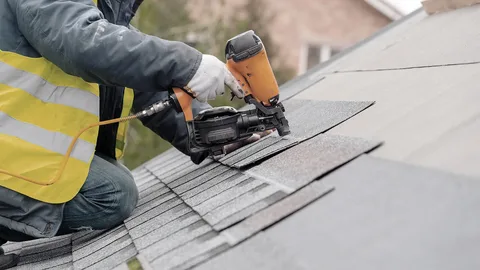When it comes to maintaining or replacing your roof, choosing the right roofing contractor is one of the most important decisions you’ll make. A roof is one of the most crucial components of your home, protecting you and your family from the elements. An improperly installed or poorly maintained roof can lead to significant damage and costly repairs down the line. Therefore, it’s essential to select a reliable, experienced, and trustworthy contractor to handle your roofing needs. In this guide, we’ll take you through everything you need to consider when choosing a roofing contractor, from assessing qualifications to reviewing past work.
The Importance of Hiring the Right Roofing Contractor
A roof is not just a structure; it’s a long-term investment. Hiring the right contractor ensures the longevity and durability of your roof, while also safeguarding your home’s integrity. A good roofing contractor will provide high-quality materials, expert installation, and valuable advice to extend the lifespan of your roof. On the other hand, a bad contractor can result in poor workmanship, subpar materials, and additional repairs that could have been avoided with a qualified expert.
Key Factors to Consider When Choosing a Roofing Contractor
1. Verify Credentials and Licensing
The first step in choosing a roofing contractor is to verify their credentials. A reputable roofing contractor should have all necessary licenses and permits for your area. These licenses confirm that the contractor has met the required local standards for roofing work and is authorized to operate in your area.
In addition to licensing, check whether the contractor carries appropriate insurance. A roofing contractor should have general liability insurance and workers’ compensation coverage. This protects you from liability in case of accidents on your property and ensures that workers are covered while working on your roof.
2. Experience Matters
While every roofing contractor needs to start somewhere, experience in the field matters greatly. A contractor who has been in the business for several years is more likely to have the skills and expertise to handle a variety of roofing issues. An experienced contractor has had the chance to refine their methods and learn how to deal with various challenges that may arise during the project.
Ask potential contractors how long they’ve been in business and inquire about the number of roofing projects they’ve completed. Additionally, ask if they specialize in specific types of roofs or roofing materials. Specialized knowledge can be a key asset, especially if your roof requires specific attention or if you are considering a unique roofing material.
3. Evaluate Past Work and References
A trustworthy roofing contractor will have a portfolio of past projects to showcase their work. Don’t hesitate to ask for examples of their completed projects. Reputable contractors often have before-and-after photos, customer testimonials, and case studies that can give you a clear idea of the quality of their work.
Request references from previous customers and follow up on them. Ask past clients about their experience with the contractor, the quality of the work performed, whether the project was completed on time, and if the price matched the initial estimate. Speaking with previous customers gives you insight into the contractor’s reliability, professionalism, and the satisfaction level of their clients.
4. Get Multiple Estimates
It’s always a good idea to get multiple estimates for the work you need done. This allows you to compare prices, services, and the scope of work offered by different contractors. Be cautious of estimates that seem too low; while everyone wants a good deal, an unusually low bid could be a red flag. It might indicate that the contractor is using subpar materials, cutting corners, or underestimating the work involved, all of which can compromise the quality of the roof installation or repair.
When obtaining estimates, ensure that each one includes the same scope of work, materials, labor, and warranties so you can make an accurate comparison. A detailed estimate should also outline the time frame for the project, including start and completion dates.
5. Review the Warranty and Guarantee
A roofing contractor that provides a strong warranty is an indicator of the quality of their work and materials. A warranty typically covers issues such as material defects or problems arising from improper installation. Be sure to get the warranty details in writing, and pay attention to the duration of the warranty and the specifics of what it covers.
A good roofing contractor will also guarantee their workmanship for a reasonable period. This ensures that if there are any issues with the installation within a certain time frame, they will address it at no extra cost.
6. Communication and Customer Service
Effective communication is a vital part of any successful project. A roofing contractor should be responsive and clear when explaining the scope of work, timelines, and any issues that arise during the project. Pay attention to how the contractor communicates with you during your initial interactions. Are they easy to reach? Do they answer your questions thoroughly? Are they willing to listen to your concerns and provide guidance?
Customer service is an important factor in choosing a roofing contractor. A contractor who values customer service will be courteous, professional, and will prioritize your satisfaction throughout the project.
7. Look for Local Contractors
When hiring a roofing contractor, it’s often better to choose someone local. Local contractors are familiar with the area’s weather conditions, building codes, and other regional factors that can affect the roofing process. In addition, local contractors tend to have a reputation to uphold within their community, so they may be more invested in providing high-quality service.
Hiring a local contractor also makes it easier to address any potential issues in the future. If you need to make warranty claims or have follow-up questions, a local contractor will be more accessible.
8. Check for Red Flags
During the selection process, keep an eye out for red flags that may signal a problem with the contractor. Some red flags include:
- Unusually low bids or offers that sound too good to be true.
- A contractor who pressures you into signing a contract on the spot.
- Lack of proper insurance or licensing.
- Poor communication or difficulty in reaching the contractor.
Trust your instincts. If something doesn’t feel right, it’s okay to walk away and find another contractor.
Conclusion
Choosing the right roofing contractor is essential for ensuring that your roof is properly installed or repaired. By considering the contractor’s experience, qualifications, customer service, and past work, you can find a professional who will deliver high-quality results. Always verify licenses, check insurance, get multiple estimates, and review warranties to ensure you’re making an informed decision. With the right contractor, you can enjoy a safe, durable roof that protects your home for years to come.
FAQs
1. How do I know if a roofing contractor is legitimate?
To verify the legitimacy of a roofing contractor, check their credentials, such as licensing and insurance. Ask for references and review their past work to ensure they have the necessary experience and a good reputation.
2. How long should a roofing contractor’s warranty last?
A reliable roofing contractor should offer a warranty that lasts at least 10 years. Some warranties may even cover the labor and materials, so be sure to clarify the terms before signing any agreement.
3. What’s the difference between a roof repair and a roof replacement?
A roof repair typically addresses specific issues, such as leaks or damage to a small area of the roof. A roof replacement, on the other hand, involves removing the old roof and installing a new one. The extent of the damage, the age of the roof, and the cost of repairs will help determine which option is best for you.
4. How long will my roof last?
The lifespan of a roof depends on factors like the roofing materials, the quality of the installation, and the weather conditions in your area. Asphalt shingles last 15-30 years, while metal roofs can last 40-70 years or longer.
5. Is it necessary to have my roof inspected regularly?
Yes, regular roof inspections are essential to catch potential issues early. Annual inspections and post-storm inspections can help detect damage before it turns into a costly problem.

